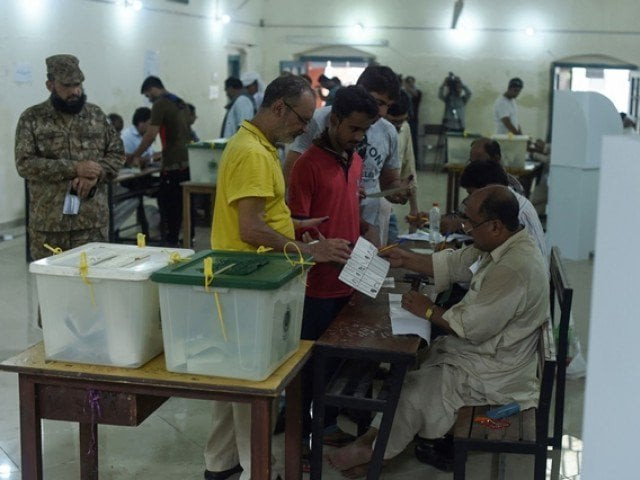Polls result controversy a collective failure
Some ROs had already informed ECP about possible RTS failure

With elections due in the next few months, the ECP had to conduct delimitations in haste. Dozens of cases related to delimitations were pending in the higher courts when schedule for July 25 general elections was announced.
PHOTO:FILE
Aside from controversies over the alleged role of unseen powers, there are serious faults, which provide losing parties the opportunity to cast aspersions on credibility of the exercise irrespective of intent of the Election Commission of Pakistan (ECP) and others directly or indirectly involved in the process.
Before the 2013 general election, the ECP had made two tall claims – “ruthless scrutiny” of contestants before the polling day and “audit of every vote polled” after elections. It had also announced to introduce a computer-based result compiling system.
Incessant incantations by the ECP about its “revolutionary” steps had created hype, raising public expectations. However, the ECP’s notion of “ruthless scrutiny” proved a mere slogan when the returning officers (ROs) assigned to examine the credentials of the candidates focused on superficial matters, instead of going into any substantial scrutiny.
Not trained for this job, the ROs measured eligibility of candidates by asking questions about “prayer details” and other religious obligations. After this examination, all and sundry were allowed to contest.
Similar to what happened this Wednesday, polling started smoothly on May 11, 2013. However, as the results started pouring in, the ECP’s computerised result compiling system collapsed within a few hours, leading to all sorts of doubts and speculations.
For post-vote audit, the ECP on proposal of NADRA had provided two types of ink pads, a normal one to stamp on ballot paper, and one with magnetic ink to make thump impression of every voter on counterfoil. The thump impressions were to be sent to NADRA to identify fake or multiple votes.
Once the polling process concluded, almost all the parties, including PTI, PPP, MQM and others, started making allegations of rigging. The PTI’s furious protests led to vote audit of many constituencies.
When counterfoils of ballot papers were sent to NADRA, its system failed to recognise 70 per cent of the thump impressions, falsifying claim of audit of every vote. However, interestingly it was never probed if the magnetic ink was worthless or NADRA system did not have the capacity to identify imposters.
Eyewash election laws
Amid controversy over alleged rigging, the then ruling party, the PML-N, in August 2014 formed a parliamentary panel, comprising all the parties represented in the parliament, to propose reforms in the electoral system.
This panel was formed as Imran Khan’s PTI along with Dr Tahirul Qadri’s PAT landed in Islamabad with hundreds of their supporters for a sit-in which continued for four months. The panel, led by then finance minister Ishaq Dar, was supposed to complete its work in three months.
A similar panel was formed in 2012, but it had failed to come up with any substantial reform proposals. Dar-led penal formed a sub panel which held more than 100 sittings before it drafted recommendations.
The same recommendations were incorporated in what is now known the Elections Act, 2017 passed in October last year and later amended several times in the following months.
Instead of bringing any substantial reforms, the new laws passed by the parliament mainly consolidated the existing election laws scattered in various statuary books.
In the name of simplifying the laws unnecessary changes were, however, made in the nomination form like omitting of column on oath about Finality of Prophethood.
What stopped polling staff from declaring results?
The move led to protests by religious parties and an almost one-month-long sit-in at a key intersection of the federal capital by a newly formed radical group led by Khadim Hussain Rizvi.
Similarly, columns providing key information about the candidate’s credentials were omitted from the application form commonly called nomination form. Parliament made these forms part of the law so no one could change it without approval of the parliament.
Ultimately, on the intervention of Supreme Court the omitted information was restored in June when process of polls was already under way. The ECP had to amend the schedule twice due to this unnecessary controversy.
Result Management System
Another important intervention of parliament in the new election laws was making the ECP bound to establish a transparent Result Management System for expeditious counting, tabulation, compilation and transmission of results.
Section 13 of the Elections Act, 2017 also made it compulsory for presiding officers to take snapshot of result count and electronically send it to the ECP headquarters immediately. It also fixed deadline of 2am, the day following polls to announce the results.
These legal provisions were added in the laws without taking into account the ground realities. Once the laws were passed, the ECP once again accosted NADRA for a solution. NADRA took the challenge with great alacrity and claimed it has it already.
EU observers satisfied with poll conduct
This was an android-based app tagged Result Transmission System (RTS). After it was used earlier this year as test run in by elections in two constituencies, the ECP announced to use it in the general election. The history repeated itself again. The RTS stopped working within an hour or two once dissemination of results started. The chaos in the aftermath once again made the polls controversial.
Had ECP used it for test run and announced results would be compiled through conventional method, this chaos would have been avoided. The possible failure of the RTS was obvious and both the ECP and NADRA were aware of it.
The RO for the Punjab Assembly’s PP-97 Faisalabad constituency and the RO for NA-142 Okara in their letters dated July 21, warned NADRA and the ECP that the RTS was not going to work.
4,945 polling stations went without basic facilities
“Just 50 presiding officers were registered and your system link went down,” wrote Shahid Ali Khokar the RO for PP-97 in his letter to NADRA chairman. He said NADRA experts had been called many times and every time they claimed to have fixed it.
After giving all these details he stated: “I have apprehensions that in such circumstances your RTS system would not perform on the poll day.” The RO, who is a civil judge, had sent copies of his letters to district election commissioner, provincial election commissioner, chief election commissioner and NADRA zonal manger.
Similar communications were made by some other ROs in advance. Had NADRA and ECP heeded to their concerns the debacle would have been avoided.
Elections are a costly exercise. It is estimated that altogether this general election would cost around Rs450 billion to Rs500 billion, including the expenses made by the ECP, candidates and political parties.
Had the ECP and NADRA learnt lessons from failure of manganic ink experiment, they could have avoided controversy this time. It is yet to be seen if anyone will be held responsible for the new debacle.
Constitutional requirements
The ECP and NADRA are not the only ones culpable. Political parties especially those who remained part of successive governments cannot be exonerated as well. As per law, country should have population census and fresh delimitations every 10 years.
Census was due in 2008 when the PPP came to power. It completed its five-year term but could not conduct census. The PML-N came to power as a result of 2013 polls, but it also kept on delaying holding census until the Supreme Court intervened.
However, final results of the headcount exercise conducted in May 2017 are still pending. The parliament passed amendment in the Constitution earlier this year, providing room for the ECP to remark boundaries of constituencies on the basis of provisional results of last year’s census.
With elections due in the next few months, the ECP had to conduct delimitations in haste. Dozens of cases related to delimitations were pending in the higher courts when schedule for July 25 general elections was announced.
These cases could have provided the courts an excellent opportunity if elections were to be delayed, but the judges disposed of all these cases rejecting every plea for postponement.
Many parties now complain that through new delimitations, gerrymandering was done and constituencies were marked to their disadvantage. Had the census been held and the new election laws passed on time, these controversies could have been avoided.
Mismanagement of polling staff
Complaints of mismanagement on part of staff deputed on polling stations are common. Most of these complaints emerge because of their insufficient training or obdurate attitude.
It was explicitly mentioned in the ECP code of conduct for polling staff, and security personal that media and election observers would be allowed to witness the whole election process. However, the army and police personnel deputed on security duty did not bother to go through their code of conduct.
Journalists were stopped from entering polling stations with their cameras on the pretext that no one is allowed to enter polling station with cell phones. Carrying cell phone inside a polling station was banned for voters but the security personnel applied the same rule to everyone.
The ECP deputed more than 800,000 government servants on election duty as presiding officers and polling officers in 85,000 polling stations set-up across country. Had one staffer been deputed at every polling station to guide the voters, it would have facilitated the voters.
In big cities where there were several polling booths at each polling station, voters had to go and check every one of them to locate on which polling booth they were to cast their vote. Just one official deputed at every polling station among these staffers could have resolved this problem.
As a judge of the Supreme Court, the caretaker Prime Minister Nasirul Mulk had conducted an inquiry into rigging allegations made by the PTI after 2013 polls. His judicial report on rigging allegations included more than 40 recommendations. Many of them are yet to be implemented.
Also the polling staff later complained of provision of insufficient number of Form-45, a situation which turned into a controversy but which could have been avoided if the forms were provided in adequate numbers.



















COMMENTS
Comments are moderated and generally will be posted if they are on-topic and not abusive.
For more information, please see our Comments FAQ